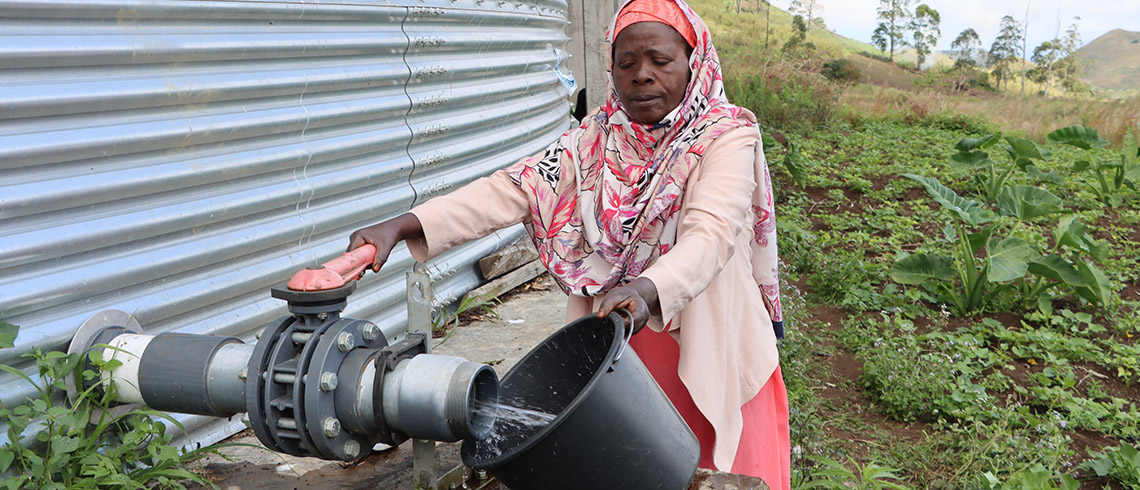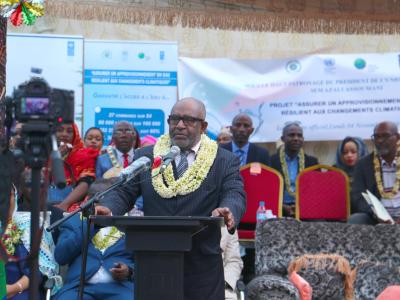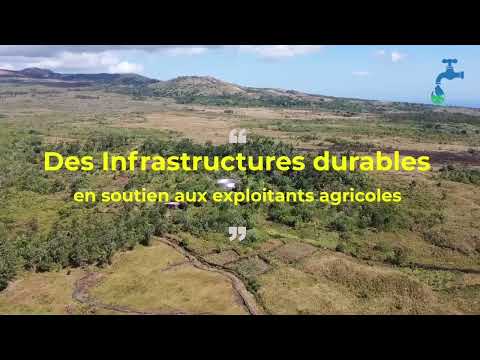
The Government of Comoros in partnership with the United Nations Development Programme (UNDP) and a broad coalition of other international actors is stepping up efforts to ensure climate-resilient water supplies for 450,000 people.
Funded by the Green Climate Fund the project 'Ensuring Climate Resilient Water Supplies in the Comoros Islands' (2019 - 2027) will reach over half of the people living in the Comoros directly, and 9 out of 10 people indirectly, ensuring children have water to drink, farmers can grow successful crops and feed their families, and the Small Island Developing State of Comoros can adapt its economy and society to the catastrophic risks brought on by climate change.
Climate change impacts threaten to derail recent development gains in Comoros – where approximately 80 percent of the rural population is reliant on rain-fed agriculture. United Nations models indicate a potential reduction in dry-season rainfall of up to 47 percent by 2090 in Comoros, increased rains in the wet season, and more severe cyclone activity.
Access to surface water on three of the small islands of the Comoros is a challenge. The main island of Grande Comore has no surface water, requiring coastal towns to exploit marginally fresh groundwater resources. The rural upland communities, making up 50 percent of the island’s population, rely solely on rainwater harvesting. On the two more remote and poorer islands of Anjouan and Moheli, there are no proven groundwater resources and the people there are completely reliant on seasonally variable streams.
The project aligns with Comoros’ Accelerated Growth and Sustainable Development Strategy and the government’s vision to reduce poverty and expand access to reliable and safe drinking water and sanitation, especially for the most vulnerable people like smallholder farmers that rely on rainfed agriculture to feed their families. The eight-year project works to achieve a national paradigm shift in water resources management, allowing the Government of Comoros to make good on commitments to increase water supply to 100 percent of its citizens by 2030 and provide all of our farmers with access to irrigation water.
The project will strengthen water resources management and environmental monitoring, improve groundwater management and preservation, expand hydrological and meteorological monitoring infrastructure, protect ecosystems and regulate stream flow, and integrate local populations into water resources management.
The US$60 million project will be implemented by the Comoros Ministry of Agriculture, Fisheries, Environment, Territory Planning and Urban, in conjunction with national and state governments, water service providers, water user associations and communities, and their development partners. A broad coalition that includes the China Geo-Engineering Corporation, the Arab Fund for Economic and Social Development (FADES), and UNDP came together to provide over US$18 million in co-financing for this project, including a US$2 million grant from UNDP, a US$1.9 million in-kind donation from the China Geo-Engineering Corporation and US$290,000 from FADES.
The project will build integrated water resource management improvements in 32 watersheds with improved water monitoring and management, build capacity for water planning to support strong institutions and inform a water tariff system to ensure sustainability, build important infrastructure to increase the resilience of water supply facilities so they can operate year-round during both the wet and dry seasons, and build infrastructure to protect people from floods and droughts.
- Community
- District
- National
- National Governments
- United Nations Development Programme (UNDP)
450,000 direct, 800,000 indirect
- Green Climate Fund
- Comoros Ministry of Agriculture, Fisheries, Environment, Territory Planning and Urban
- United Nations Development Programme (UNDP)
Expected outcomes
Output 1 - Climate informed water supply planning and management
Output 2 - Climate Informed water resources and watershed management including forecasting and early warnings of climate risks
Output 3- Climate resilient water supply infrastructure
Comoros is one of only two countries in the world to be classified as a Least Developed Country, an African State and a Small Island Developing State (SIDS) by the UN System. The hydro-physical features of Comoros significantly contribute to its high vulnerability to climate change impacts. The entire country, separated into three islands, has a land area of only 2,612 km2 and no land further than 7km from the coast. Comoros therefore has very small watersheds and aquifers with very limited natural storage which respond rapidly to changes in rainfall and are consequently highly vulnerable to rainfall variability and intensity, resulting in significant drought, flood erosion and salinization impacts.
Climate change predictions for Comoros include an increase in rainfall variability, lengthening of droughts and increasing frequency and intensity of storm floods and resulting erosion.
The main island of Grand Comore has no surface water, requiring coastal towns to exploit marginally fresh groundwater resources, whilst the rural upland communities, making up 50% of the island’s population, have to rely solely on rainwater harvesting. On the two more remote and poorer islands of Anjouan and Moheli there are no proven groundwater resources and therefore are completely reliant on the seasonally variable streams.
Comoros is also one of the poorest countries in the world, with an estimated 80% of the rural population considered poverty-stricken and 46% of the population living in absolute poverty (<$1.25/person/day). This severely constrains its national adaptation capacity.
One of the most urgent needs in Comoros, as stated by the NAPA, is to build the resilience of their water supply to the impacts of climate change. More specifically Comoros needs to increase the resilience of its limited water resources and watersheds, protect its water supply infrastructure and strengthen the adaptation capacity of its institutions and communities to plan and operate in increasing climatic extremes.
National capacity to adapt to climate change risks in Comoros is extremely limited, as it is for many SIDS, but particularly those that are also LDCs. At least 14.3% of the population is unemployed. The unemployment rate among those aged 15-24 is very high at 50.5%. Between 70-80% of the Comorian population are small-scale farmers that are dependent on rain-fed water resources for subsistence agriculture. National food security is therefore closely linked to water security and to climate change impacts and their successful adaptation. More widely, poverty issues and limited employment opportunities are severely hindering the country from self-sustaining economic growth.
Comoros is therefore not only intrinsically vulnerable to climate change impacts but has little current capacity to strengthen its adaptive capacity to be resilient to these impacts. This lack of resilience extends as far as the capacity to submit grant applications to the global climate change adaptation funds.
Lancement officiel du Projet GCF EAU pour les Comores
Moroni, 4 novembre 2019 – C’est au terme d’une cérémonie riche en couleur à Vouani sur l’île de Ndzuani, que le Président de l’Union des Comores, M. Azali Assoumani, a procédé ce 4 novembre 2019 au lancement officiel du projet « Approvisionnement en eau résilient aux changements climatiques ».
« Je suis heureux de voir un de nos engagements phares se réaliser à travers ce projet qui ambitionne d’adresser simultanément plusieurs défis majeurs, avec des implications sur la santé, la nutrition, la sécurité alimentaire, la production agricole ainsi que le développement socio-économique », a témoigné le Président de l’Union des Comores.
New climate resilient water project will ensure reliable water supplies for 450,000 people in Comoros
‘Children will have water to drink, farmers can grow successful crops and feed their families, and we can adapt our economy and our society to the catastrophic risks brought on by climate change’ says Minister Abdou on GCF board approval for groundbreaking UNDP-supported project
Un nouveau projet d'approvisionnement en eau pour 450.000 personnes
« Les enfants auront de l’eau à boire, les agriculteurs pourront cultiver avec succès et nourrir leur famille, et nous pourrons adapter notre économie et notre société aux risques de catastrophes posés par le changement climatique », a déclaré le Ministre Moustadroine Abdou au sujet de l’approbation par le Conseil d’Administration du Fonds Vert pour le Climat d’un projet novateur soutenu par le PNUD.
Output 1. Climate informed water supply planning and management
Activity 1.1 Prepare recommendations and legal guidance on the integration of climate change adaptation into the national (federal) and regional (state) water sector agencies governance frameworks, regulations and operations
Activity 1.2 Develop water sector climate change risk reduction awareness raising programme for national and state agencies and establish CCA knowledge and information exchange mechanisms
Activity 1.3 Develop and apply criteria for assessing socially sensitive water pricing mechanisms ensuring prices take into account the actual costs of production, storage and processing required in view of the projected climate stresses
Activity 1.4 Develop planning guidance on source protection and water quality standards in view of climate change, operating procedures during periods of drought/floods; and safety plans
Activity 1.5 Design and conduct trainings on best practices and gender-sensitive techniques of climate change adaptation in the context of water management, health and nutrition among national, regional and local water stakeholders
Activity 1.6 Strengthen decentralized water resources management capacities to undertake climate risk reduction assessments and develop and deliver awareness campaigns and training programmes to Water Management Committees and users
Output 2: Climate Informed Water Resources and Watershed Management including forecasting and early warnings of climate risks
Activity 2.1 Establish climate resilience focused IWRM Committees and Watershed Risk Reduction Action Plans in the project intervention areas
Activity 2.2 Implement the water protection and risk mitigating measures on the ground/operationalize the risk reduction plans
Activity 2.3 Support IWRM Management Committees to establish water source protection zones and raise public awareness on climate risk reduction benefits of watershed management
Activity 2.4 Establish water resource monitoring network and upgrade the existing monitoring infrastructure to enable the collection of the required climate/weather data
Activity 2.5 Build the capacities of the meteorological services to analyse and produce drought and flood forecasts for targeted users, including for flood early warning system
Activity 2.6 Build the capacity of the key government, local authorities and committees to interpret the climate information and raise awareness of the local population to act upon the forecasts and EWS
Output 3: Climate Resilient Water Supply Infrastructure Activity
3.1 Undertake climate risk assessments of existing groundwater abstraction wells to develop risk reduction pumping strategies, and construction of additional boreholes in zones at risk of drought water scarcity in Grande Comore Activity
3.2 Build infrastructure to increase resilience of water supply facilities to extended duration low flow periods, greater intensity flood flow damage and flood flow higher turbidity and bacteria loadings (Grande Comore, Anjouan island and Moheli island)
Activity 3.3 Installation of flowmeters to support climate resilient tariff adjustments, and leakage reduction programmes to improve the water pricing and management system taking into account the additional costs associated with climatic hazards
- UNDPMulengera BahalokwibaleRegional Technical Specialist, Climate Change Adaptation















